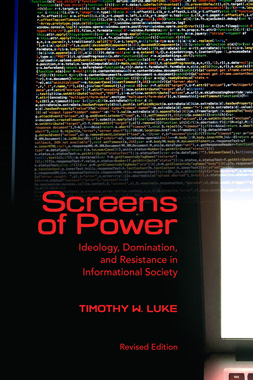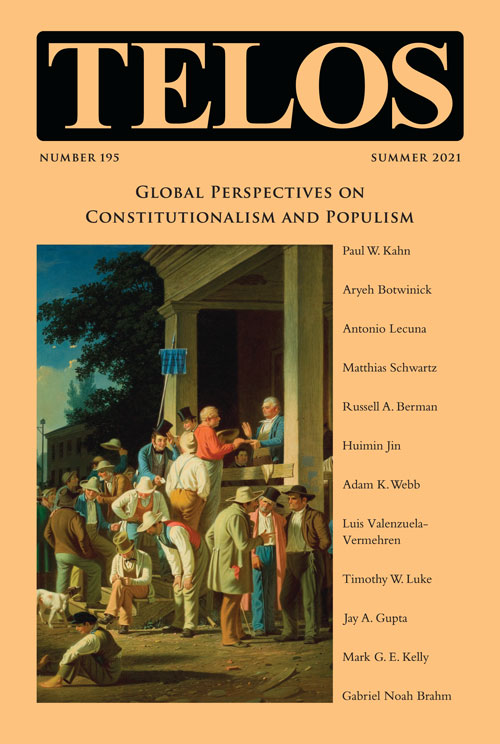By Henryk M. Broder · Monday, June 28, 2021 The following interview appeared originally in German in Die Weltwoche on June 18, 2021. Translated into English by Xuxu Song. A separate commentary by David Pan appears here.
Hans-Georg Maaßen, President of Germany’s Federal Office for the Protection of the Constitution from 2012 to 2018, is accused of spreading anti-Semitic ideas. The accusation comes from the milieu of the “Fridays for Future” movement. The timing, Maaßen suspects, is no coincidence and has nothing to do with the political climate. Rather, they want to prevent his election as a member of the Bundestag.
Continue reading →
By Telos Press · Wednesday, June 23, 2021 Writing in the current issue of New Political Science, Saladdin Ahmed reviews Timothy W. Luke’s Screens of Power: Ideology, Domination, and Resistance in Informational Society, recently published in a new edition by Telos Press. Purchase your copy of Screens of Power today in our online store and save 25% off the list price.
An excerpt of the review:
 Screens of Power first came out in 1989, a time that would turn out to be the most significant historical turn in global politics after World War II. The book’s author, Timothy W. Luke, offers a concrete account of the history of neoconservatism, grounding his claims in critical analyses of the production of signs, codes, and mass opinion that were at the time making evident their systematic role in the perpetuation of what would emerge as capitalist absolutism. Luke’s book offers a groundbreaking view of both the macro levels of social mobilization and micro processes of ideological hegemony under which corporate capitalist actors would eventually achieve this end. . . . About three decades later, the soundness of Luke’s analysis barely needs any defense. To be clear though, as an exemplary work of critical theory, Screens of Power did not engage in the business of prophecies and game of predictions. Instead, it had the ability to look directly into the actually existing, and one might say with hindsight, ever-growing abyss of capitalist absolutism. The book may have seemed pessimistic in 1989, but now it reads as a faithfully realistic analysis of the neoliberal age. Screens of Power first came out in 1989, a time that would turn out to be the most significant historical turn in global politics after World War II. The book’s author, Timothy W. Luke, offers a concrete account of the history of neoconservatism, grounding his claims in critical analyses of the production of signs, codes, and mass opinion that were at the time making evident their systematic role in the perpetuation of what would emerge as capitalist absolutism. Luke’s book offers a groundbreaking view of both the macro levels of social mobilization and micro processes of ideological hegemony under which corporate capitalist actors would eventually achieve this end. . . . About three decades later, the soundness of Luke’s analysis barely needs any defense. To be clear though, as an exemplary work of critical theory, Screens of Power did not engage in the business of prophecies and game of predictions. Instead, it had the ability to look directly into the actually existing, and one might say with hindsight, ever-growing abyss of capitalist absolutism. The book may have seemed pessimistic in 1989, but now it reads as a faithfully realistic analysis of the neoliberal age.
Continue reading →
By David Pan · Friday, June 18, 2021 Telos 195 (Summer 2021): Global Perspectives on Constitutionalism and Populism is now available for purchase in our store. Individual subscriptions to Telos are also available in both print and online formats.
 After watching the images of the January 6 Capitol riot, many Americans concluded that right-wing populism threatens the basic rules of our constitutional order. In this view, the U.S. Constitution establishes a universal order that is detached from any particular orientation and provides the neutral ground upon which differences can be discussed, while populists upset the rules of discussion and destroy the basis of a common project. Consequently, since populism is at odds with the Constitution, the solution would be to try to reimpose a measure of rationality upon the unruly. Yet the nagging concern behind this perspective is not just the violation of rules but the suspicion that populism is ultimately motivated by racism and sexism. In this case, the real opposition would not be between constitutionalism and populism but between two understandings of the Constitution, that is, two conceptions of the character of the people, one egalitarian and the other racist. The difficulty is that the laws of a constitution cannot exist independently of a people with a specific history. Rules cannot be neutral but imply a perspective on the world, and the conflict between constitutionalism and populism may in fact be a symptom of a conflict between two factions within the people, each of which is attempting to establish itself as the proper representation of the will of the people as a whole. After watching the images of the January 6 Capitol riot, many Americans concluded that right-wing populism threatens the basic rules of our constitutional order. In this view, the U.S. Constitution establishes a universal order that is detached from any particular orientation and provides the neutral ground upon which differences can be discussed, while populists upset the rules of discussion and destroy the basis of a common project. Consequently, since populism is at odds with the Constitution, the solution would be to try to reimpose a measure of rationality upon the unruly. Yet the nagging concern behind this perspective is not just the violation of rules but the suspicion that populism is ultimately motivated by racism and sexism. In this case, the real opposition would not be between constitutionalism and populism but between two understandings of the Constitution, that is, two conceptions of the character of the people, one egalitarian and the other racist. The difficulty is that the laws of a constitution cannot exist independently of a people with a specific history. Rules cannot be neutral but imply a perspective on the world, and the conflict between constitutionalism and populism may in fact be a symptom of a conflict between two factions within the people, each of which is attempting to establish itself as the proper representation of the will of the people as a whole.
Continue reading →
By Telos Press · Friday, June 4, 2021 In today’s episode of the Telos Press Podcast, Camelia Raghinaru talks with Michael Millerman about his article “The Ethnosociological and Existential Dimensions of Alexander Dugin’s Populism,” from Telos 193 (Winter 2020). An excerpt of the article appears here. To learn how your university can subscribe to Telos, visit our library recommendation page. Print copies of Telos 193 are available for purchase in our store.
Listen to the podcast here.
Continue reading →
By Telos Press · Friday, May 21, 2021 In today’s episode of the Telos Press Podcast, David Pan talks with Edward Hadas about his article “Three Rival Versions of Monetary Enquiry: The Ideologies of Money,” from Telos 194 (Spring 2021). An excerpt of the article appears here. If your university has an online subscription to Telos, you can read the full article at the Telos Online website. For non-subscribers, learn how your university can begin a subscription to Telos at our library recommendation page. Print copies of Telos 194 are available for purchase in our online store.
Listen to the podcast here.
Continue reading →
By Telos Press · Thursday, May 13, 2021 In today’s episode of the Telos Press Podcast, David Pan talks with Jay Gupta, Mark G.E. Kelly, and Timothy W. Luke about the U.S. Capitol riot on January 6, 2021. Their discussion covers a range of topics, including the main causes of the riot, the cultic character of Trump’s supporters, whether the breach of the Capitol was more about symbolism or substance, the declining legitimacy of U.S. political institutions and the loss of faith in the Constitution, the rhetoric of democracy, populism as a rebellion against the administrative deep state and managerial capitalism, the changing politics of race and racial divides, and the realignment of Democratic and Republican coalitions in the wake of Trump. Telos 194 (Spring 2021) features a group of essays on the U.S. Capitol riot, excerpts of which appear here. Click through to read the full articles at the Telos Online website (subscription required). To learn how your university can subscribe to Telos, visit our library recommendation page. Print copies of Telos 194 are available for purchase in our store.
Continue reading →
|
|




